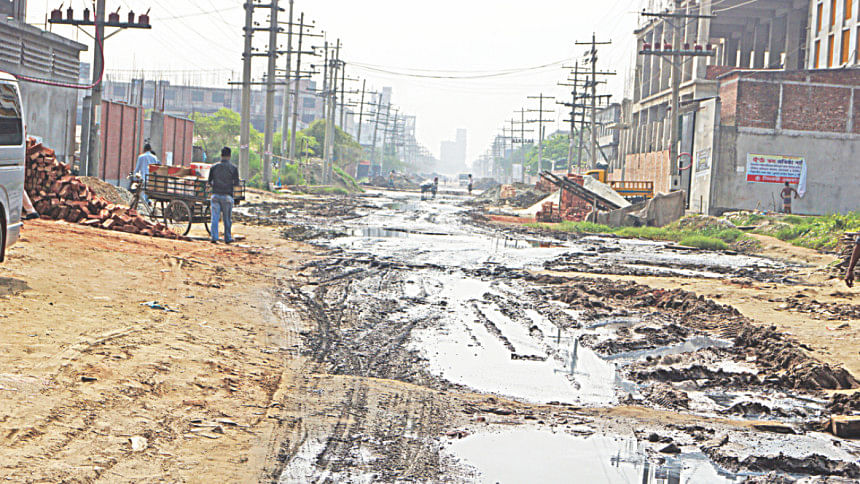Same old problems

Toxic liquid waste discharged from the newly-relocated Savar Tannery Industrial Estate has been a cause of concern for the workers.
As the liquid waste spill out of the drain and spread over the roads inside the industrial estate in the absence of a proper drainage network, the workers have to navigate their way through the roads submerged by untreated chemical-mixed water.
To save the river Burigana, the tanneries were relocated to the Savar's tannery estate from the capital's Hazaribagh. But the situation has not changed for the better.
During a recent visit to the estate, the roads were found to be in a terrible state. Many roads developed potholes, collecting liquid waste.
Talking to The Daily Star, some tannery workers complained that the sorry state of the roads had been hampering their day-to-day activities.
Ismail Hossen, a worker, said they cannot move freely as some parts of the roads are always waterlogged and muddy.
During monsoon, it is very difficult to walk, he added.
Another worker, Ruhul Amin, said they used to work in a polluting environment in Hazaribagh.
The working condition in Savar is no better, he said, adding that the road remains muddy no matter it rains or not.
Moreover, there is no light on the streets, creating an uncomfortable situation for them while moving during night.
Jamil Khan, a worker of Apex Tannery, echoed Ruhul Amin.
He added that the authorities have to develop the road communications for ensuring better working environment for the workers.
It is worth mentioning that thousands of tannery workers at the tannery industrial estate on August 24 demonstrated to realise their basic workplace rights and facilities.
Like the workers, owners are also not happy with the facilities.
Abu Abed, owner of Sunlight Tannery, said, “We came here for good but infrastructure is not up to the mark.”
Due to the battered condition of the roads, they have to pay extra for transportation purpose, said Abu Abed.
If the roads are not repaired immediately, the situation will take a turn for the worse, he said, adding that the authorities were yet to take any steps in this regard.
On the other hand, the discharge of untreated toxic waste has ripple effect too. If it rains, the situation gets worse. During the heavy rainfall around a month back, the liquid waste mixed with rainwater spread over a portion of the adjoining Zauchar village, posing a health threat to the locals.
Nayon Mia, a resident of the village, said his area remained waterlogged for days even after the rain had stopped.
And the toxic waste discharged from tannery mixing with rainwater polluted the area, he said.
They informed the tannery authorities about the matter, but to no avail, alleged Nayon.
Ali Hossen, assistant teacher of Maritas Ideal School, said during the recent downpour, the rainwater mixed with the chemical waste entered the school ground.
In fear, many students stopped coming to the school then, he added.
Jahid Hossen, a fifth grader, said he could not attend school for two days as the school ground was submerged by the chemical-mixed water.
On the other hand, the liquid waste continued to spread bad odour in the area, making it difficult to breathe, added the fifth grader.
"How can the liquid waste enter the adjacent village if the tannery is built in a proper way?" questioned Mohammad Shamsul Haque, a green activist of Savar.
This correspondent talked to Moin Uddin, deputy manager of Bangladesh Small and Cottage Industries Corporation (BSCIC). He said many factory owners are still digging roads for setting up utility service lines, contributing to the sorry state of the roads inside the estate.
He said a portion of boundary wall on north-east side of the tannery estate got damaged.
Through the damaged portion, the rainwater of the estate mixed with toxic waste flooded the adjacent village, he said.
Another deputy manager of BSCIC, Mostafa Mazumder, also acknowledged the dilapidated condition of the roads. But he said they had repaired some portions.
The high-ups have been informed about the condition, he said, adding that the problems would be addressed soon.

 For all latest news, follow The Daily Star's Google News channel.
For all latest news, follow The Daily Star's Google News channel. 



Comments